HOME >> CHINA
Aid to HIV-positive Uyghur women obstructed by Islamic extremists
By Huang Jingjing in Yining Source:Global Times Published: 2015/11/16 19:58:01
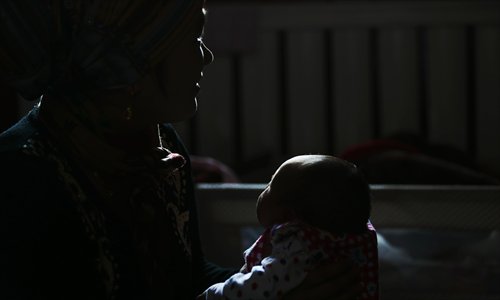
Guli embraces her daughter on November 10. Photo: Cui Meng/GT
HIV-positive Guli, 16, is already a mother of two. Sitting on bended knees in her home, between her newborn in a cradle and her 18-month-old daughter sleeping on the carpet, the Uyghur mother talks shyly about her experience.
She started to live with the children's father, who is 27 years older than her, two years ago. The man, a former drug addict, is HIV positive. But he didn't tell Guli this fact, use condoms when he had sex with her or take free antiretroviral drugs.
Guli was infected. She later became one of the around 1,000 pregnant women who have been reported living with HIV since 2003 in Yining, capital city of Yili Kazak Autonomous Prefecture in Xinjiang Uyghur Autonomous Region, one of the country's four regions with the highest HIV/AIDS prevalence.
The other three regions are Dehong in Yunnan Province, Liangshan in Sichuan Province and Zhumadian in Henan Province. But due to barriers such as illiteracy, the low status of women and religious conservatism, AIDS prevention and control in Yili has been especially arduous.
Guli's first daughter was not born with HIV. Her second baby will have a blood test when she is 42 days old. Guli is confident that she will be healthy too as she did exactly what local health workers asked her to do.
Mothers have a 15-45 percent chance of transmitting HIV to their children during pregnancy, labor, delivery or breastfeeding. But that rate can drop to below 5 percent if mothers and children receive antiretroviral treatment and don't breastfeed, according to the World Health Organization.
According to the Yining Maternal and Child Service Center, which has run a program to prevent parent-to-child transmission (PPTCT) of HIV since 2003, the 533 pregnent women who received treatment under the program had 495 healthy babies.
However, some babies were still born with HIV. Some pregnant women were diagnosed with HIV too late for an effective intervention, some mothers failed to take doctors' advice to take medicine on schedule while others were simply unlucky.
Mistrust and drugs
"One major problem is mistrust. Some people are skeptical about medicines' efficacy. Some religious extremists preach that life is given by Allah and mustn't be treated with the gift from the Communist Party, the free antiretroviral medicines," Ji Ergao, deputy director of the Yining Center for Disease Control and Prevention (CDC), told the Global Times. Yining has a population of 560,000 made up of 37 ethnic groups. Over 48 percent are Uyghurs, 36 percent are Han and 7 percent are Hui.
Rena (pseudonym), 34, whose husband was infected with HIV through intravenous drug use, said he refused to take medicine at first. "He and his friends living with HIV believed that the government considered them to be useless and wanted them to die faster by offering free medicine," Rena told the Global Times. "Some even believe that the treatment harms fertility and hurts the next generation."
"In some families, the men don't take medicine, nor do they allow their wives to take medicine," she noted.
Li Li, who directs PPTCT treatment at the Yining Maternal and Child Service Center said that "some couples don't take our advice seriously, they either stopped taking medicines out of fear of harming the fetus or take them irregularly."
Drug addiction used to be epidemic in Yili, which is not far from the "Golden Crescent," a major source of drugs along the borders of Afghanistan, Pakistan and Iran. The first HIV carrier in the prefecture was discovered in 1996. Ten years ago up to 90 percent of HIV infections were caused by addicts sharing needles, according to the Yining CDC.
In 2003 the country stopped mandatory pre-marital medical check-ups. The next year, tests performed on pregnant women in Yining showed that around 1 in 10 had HIV. Li said they soon reported the situation to the Yining local government, which resumed the mandatory HIV test for new couples in 2005.
Maerdan (pseudonym), 34, said she found out she had HIV in 2008 when her daughter was 3 years old. Her daughter is also HIV positive. Health workers offered them a free HIV test when her husband was detained for using drugs.
Like Maerdan, many women were kept in the dark about their partner's condition.
Low status at home
Women's low status in the region is a key problem in fighting HIV/AIDS, Li Li noted. According to the Yining CDC's statistics, 94 percent of the pregnant women living with HIV are Uyghurs and more than half are between 31 and 40. Most of them have no jobs and are poorly educated.
"According to local custom, women rely on their husbands and don't make their own decisions," Li said.
Guli said her husband denied any guilt but accused her of picking up the disease somewhere else.
Born in a poor village in Yining, she said her parents died when she was 9 and her sick grandmother asked her to find support when she turned 14. She later met a man who earned about 2,000 yuan a month.
Now she lives with him and their children in a 16-square-meter room in suburban Yining.
After divorcing her ex-husband, Maerdan remarried a non-HIV carrier. The man is much older than her, of short stature and has a hunchback, but he accepted her and her daughter. Now she has given birth to two more daughters, who were both born free of the virus in part thanks to the PPTCT program. She insists on taking antiretroviral drugs regularly. Her husband takes regular HIV tests and has not been infected by the virus.
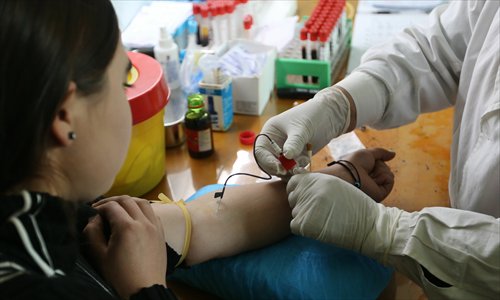
A doctor administers a premarital check on a woman at an Yining hospital on November 11. Photo: Cui Meng/GT
Peer support
Noting the serious situation in Yining, the National PPTCT Program has been working with UNICEF in Yining since 2003. With financial and technical support from UNICEF, the Yining Maternal and Child Service Center have promoted peer support in the region.
They recruited and trained women who benefited from the PPTCT program and used them as coordinators in villages and communities to encourage women to take HIV/AIDS tests and receive timely interventions.
Reziyan, president of the Yining Maternal and Child Service Center, said it was hard for official workers to do that job.
"Once a woman was confirmed as HIV positive, we found it hard to notify her. They might be frustrated when they learn of their husbands' secret, or worried their own secret from their former marriage would be discovered," Reziyan told the Global Times, adding that they often fear their husband might abandon them.
"When we asked them over the phone to take pregnancy tests and receive treatment, some refused and even threatened that they would commit suicide if we went to their home," said Reziyan.
Now through peer support, more women turn to the center voluntarily and receive treatment.
Peer support is not easy at the beginning. During their initial visits to some households, they were met with threats from the men of the house.
Rena got involved in peer education last year and she has already provided counseling to eight families. "I mainly visit the homes of my husband's friends. Despite the threats, I come back. My husband used to be weak and is much better now after sticking to antiretroviral treatment," she said.
The peer supporters used to receive a small monthly subsidy, but this has recently been cut.
Rukeya (pseudonym), whose two children were born healthy, said they would continue to do the job anyway. "We don't do it for money. We hope more women could live happily," she said. She was infected with HIV by her husband, who divorced her this April after she was diagnosed with cancer.
"Every month, [about 10 HIV positive mothers] organize a gathering, sharing happiness and miseries," she said.
They also suffer discrimination from relatives and neighbors, who regard all a family's members as infected once one of them is an addict. Moving away to urban areas is often the only choice for many rural people with HIV/AIDS.
Governmental policies
The government has also launched a series of policies to prevent the transmission of the virus. According to the official from Yining CDC, apart from a screening campaign, they demand all people take HIV tests when getting a marriage certificate or pregnant, undergoing sterilization operations or getting the health certificate that is required for public employees.
The local government provides a small allowance for HIV-positive patients. This allowance is specifically for HIV-positive patients so that they are able to sustain themselves.
To reduce transmission through drug use, methadone and needle exchange programs have been running for over a decade.
The proportion of those that are infected with HIV/AIDS that catch the virus through drug use has dropped to less than 20 percent but is still high compared with the national average of 5.8 percent.
Guli said her husband has quit drugs. Not yet at the legal marital age, she hasn't acquired marriage certificates nor her children's vital household registration yet. This doesn't upset her. Usually, the local authorities will handle it without fining them.
Guli's biggest wish is to become a good mother and see her children grow up healthy.
"I hope they will study well and do not repeat my suffering," she said. She quit school after studying for only one year. Unable to read or speak Putonghua, the interview with her was conducted via a Uygur translator.
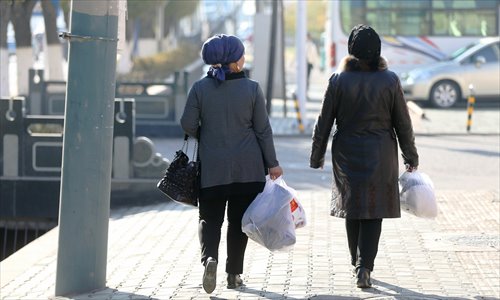
Rukeya, 41, and Rena, 34, (both pseudonyms) walk together in Ili prefecture, Xinjiang Uygur Autonomous Region on November 10. Both women contracted HIV from their now ex-husbands, who both suffered from drug addictions. They have since received treatment and currently do volunteer work in HIV prevention and control. Photo: Cui Meng/ GT
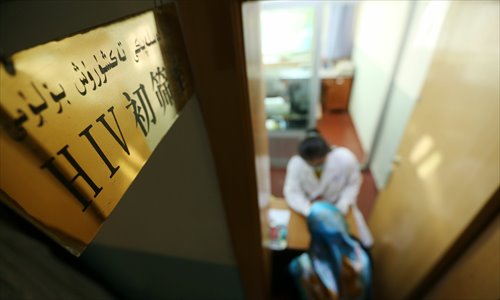
An HIV screening room at an Yining Hospital Photo: Cui Meng/ GT
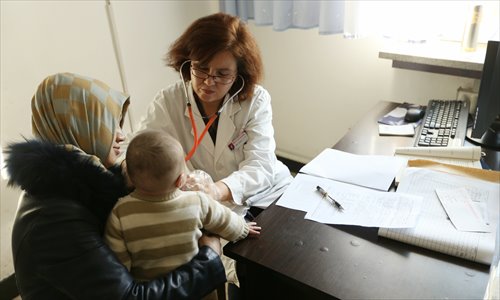
A child receives a routine check-up as part of the intervention treatment for mother-to-infant transmission of HIV on November 11. Photo: Cui Meng/ GT
Newspaper headline: Veiled ignorance
Posted in: In-Depth